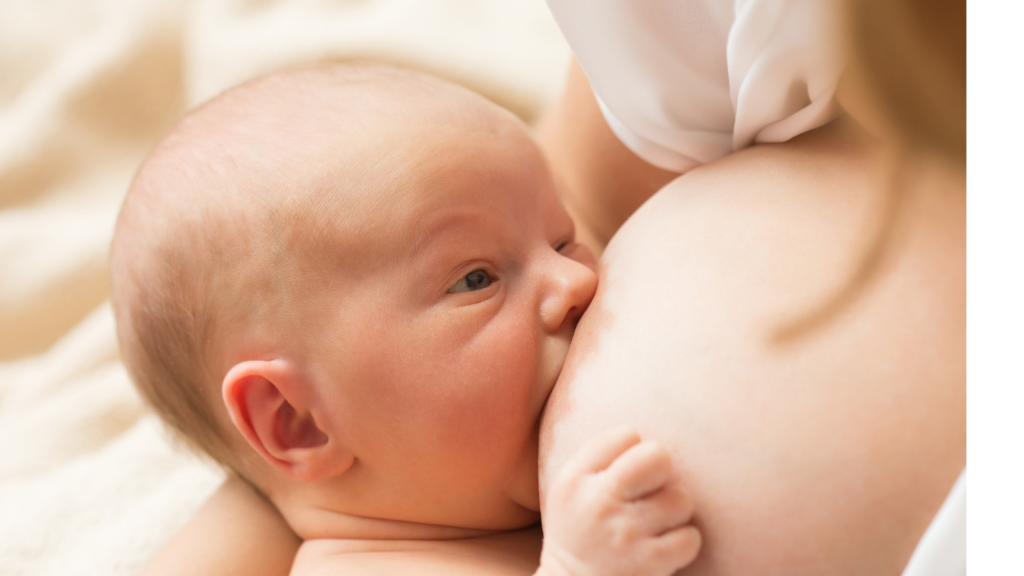
Breast milk has everything a baby needs for the first 6 months of life, like fats, carbs, proteins, vitamins, minerals, and water. It’s easy for the baby to digest and use. Breast milk also has unique stuff that boosts the baby’s young immune system, keeping them safe from infections. Breastfeeding benefits the baby’s tummy by breaking down food and absorbing the good stuff from it.
Breastfeeding benefits for infants
During the initial six months of life, human breast milk is a sophisticated secretion and represents the ideal nourishment for infants. The quantity and composition of this milk are primarily unaffected by the mother’s dietary choices. Changes in milk composition occur during lactogenesis II, serving as biochemical indicators of the onset of abundant milk production. After the first month of breastfeeding, the milk doesn’t change much in how it’s made, but as the baby stops breastfeeding, there’s less and less milk.
How is breast milk made?
Breast milk is made by special cells called lactocytes inside the mammary gland’s tiny sacs called alveoli. These sacs are surrounded by small blood vessels. Important substances like glucose, amino acids, fatty acids, minerals, and vitamins travel from the blood to the bottom layer of the lactocytes. The lactocytes use these substances to create the different parts of milk. Afterward, these milk components are released through the top layer of the lactocytes into the space inside the alveoli.
Lactogenesis I
Lactogenesis I signifies the phase during the second trimester of pregnancy when the mammary glands acquire the capability to release milk constituents. It has been estimated that around 30 mL of colostrum can be secreted daily in the later stages of pregnancy. This increase in lactose, one of the secreted components, is linked to a rise in prolactin levels in the bloodstream. Notably, these secreted components are not removed through suckling; instead, they are reabsorbed into the bloodstream.
Hormonal Changes
Lactogenesis II, marking the initiation of abundant milk secretion, commences shortly after childbirth. This phase relies on the presence of sufficient prolactin, insulin, and adrenal cortisol levels, with its onset triggered by the reduction of circulating progesterone following birth. Furthermore, thyroid hormone plays a vital role, as lactation initiation is impaired in hypothyroid animals. Mothers typically experience Lactogenesis II as a sudden increase in breast fullness when milk production begins.
What is the milk volume and composition?
During the first 1 to 6 months after a baby is born and they are only fed with breast milk, the amount of milk a mother produces stays pretty consistent. For moms who exclusively breastfeed one baby up to 6 months old, they typically make between 710 to 803 milliliters of milk each day. When we check milk production twice in one week, it doesn’t change much. However, it’s essential to know that not all babies drink the same amount of milk. Babies who are growing well and are exclusively breastfed might drink anywhere from 440 to more than 1220 milliliters of milk per day.
Breastfeeding Benefits

- As the baby develops, the composition of the mother’s breast milk adapts to fulfill the evolving nutritional requirements of the child.
- Breastfeeding offers protective benefits for infants, guarding against both short-term and enduring illnesses and conditions. Breastfed infants exhibit reduced susceptibility to asthma, obesity, type 1 diabetes, and sudden infant death syndrome (SIDS). They are also less likely to get ear infections and stomach bugs.
- Breast milk gives the baby special protection from illnesses by providing antibodies from the mother. This helps the baby’s immune system grow strong and keeps them safe from sickness.
- Mothers have the flexibility to breastfeed at any place and time, allowing for convenient on-the-go feeding without the need to mix formula or prepare bottles. Also, when you travel, breastfeeding can be a reassuring and familiar way to feed your baby, especially when their usual routines are changed.
- Breastfeeding can help moms stay healthier by reducing their risk of getting breast and ovarian cancer, type 2 diabetes, and high blood pressure. This is really good for their health. It’s important to know that women who breastfeed are less likely to get certain cancers, type 2 diabetes, and high blood pressure.
- Breast milk is essential for helping babies grow at a healthy weight and makes it less likely for them to become too heavy as they grow up.
- A study cited has demonstrated a significant decrease in the likelihood of babies developing overweight and obesity when breastfed for longer than 4 months. This good result might happen because babies who drink breast milk have different kinds of helpful gut bacteria in their stomachs. These bacteria could affect how their bodies store fat.
- Babies who drink breast milk have more of a particular hormone called leptin in their bodies, which helps control their hunger and how they store fat. Formula-fed babies don’t have as much of this hormone. Also, babies who breastfeed can naturally control how much milk they drink. They only drink as much as they need to feel full, which helps them learn healthy eating habits.
- Studies say that babies who drink breast milk usually have more brilliant brains and are less likely to have behavior or learning issues as they grow up. Babies born too early, called premature babies, get even more help from breastfeeding, especially when it comes to their development.
- The research has clearly demonstrated that breastfeeding has really positive impacts on the long-term development of babies’ brains.
- Breastfeeding might assist with weight loss, a common notion. It varies among women, as some may observe weight gain while breastfeeding, while others may naturally shed pounds. Breastfeeding indeed increases calorie expenditure, and after three months of nursing, you may notice a slight increase in fat burning compared to women who are not lactating, although the difference is not substantial.
How can a naturopathic doctor help a nursing mother with breastfeeding?
Breastfeeding has lots of good things for babies, so most health experts say it’s a good idea for as long as you can unless there’s a medical reason not to. Our naturopathic doctors at MakeCareHealth can help nursing moms in many ways. In the confident hormone club, they advise on what to eat, suggest herbs to boost milk and help with stress. They also recommend changes in the diet and supplements to make more milk and fix hormone problems.
If there are breast problems, they can assist with that, too. And if the baby has allergies, they can provide tips. They look at the mom’s overall health, like sleep and feelings. Working together with other healthcare experts like lactation consultants and regular doctors can make sure both the mom and baby get good support during breastfeeding. Whatever choice you make, your healthcare team can help you find the best ways and choices. You can do it!
Food that promotes breastfeeding benefits
A lot of vegetables, whole grains, and herbs have extraordinary things called galactagogues that can help make more breast milk. People from different cultures have been using these foods for a long time to make breastfeeding better. Some of these particular foods are:
- Whole grains like oats and barley.
- Foods with lots of protein, like fish, chicken, meat, or tofu.
- Beans like chickpeas and lentils.
- Green vegetables like kale, spinach, and arugula.
- Fennel or fennel seeds.
- Nuts.
- Alfalfa sprouts.
- Garlic.
- Ginger.
- Fenugreek seeds.
- Sesame seeds.
- Flaxseeds.
- Brewer’s yeast.
- Blackstrap molasses.
Many moms say these foods help with breastfeeding, but there isn’t a lot of research to prove it. Still, they are healthy foods, so it’s a good idea to eat them. You can mix them to make yummy meals like:
- Oatmeal with ground flaxseeds, almonds, and berries.
- Soup with vegetables, beans, and barley.
- A stir-fry with tofu or chicken, green vegetables, garlic, ginger, and fenugreek seeds.
- Cookies with oats, brewer’s yeast, flaxseeds, and molasses.
Besides these particular foods, it’s also essential to eat a healthy diet to make sure you have enough milk for your baby. Eating different kinds of foods like fruits, vegetables, whole grains, proteins, and healthy fats will make you feel good and give you the energy to take care of your baby.

